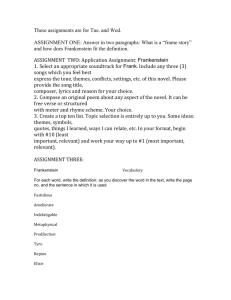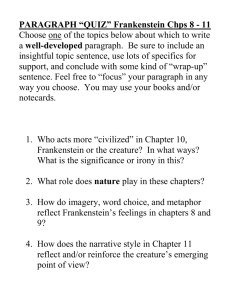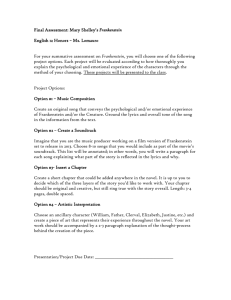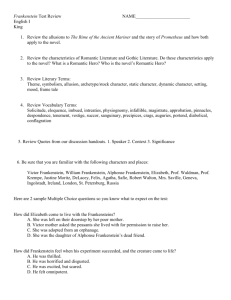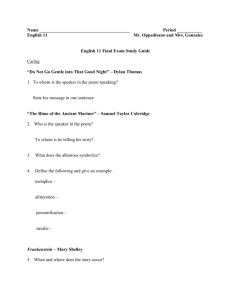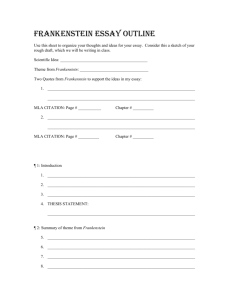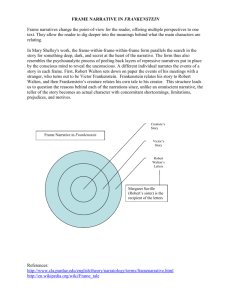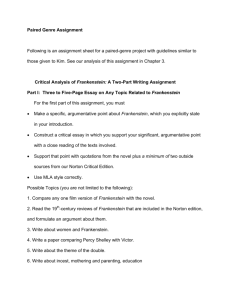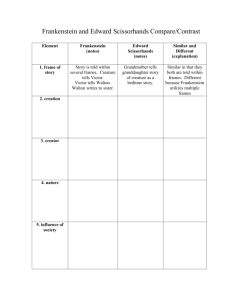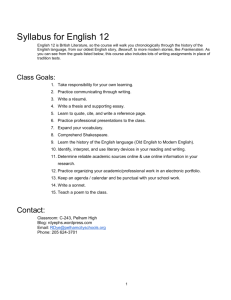This year instead of writing papers over the summer, you will need to
advertisement
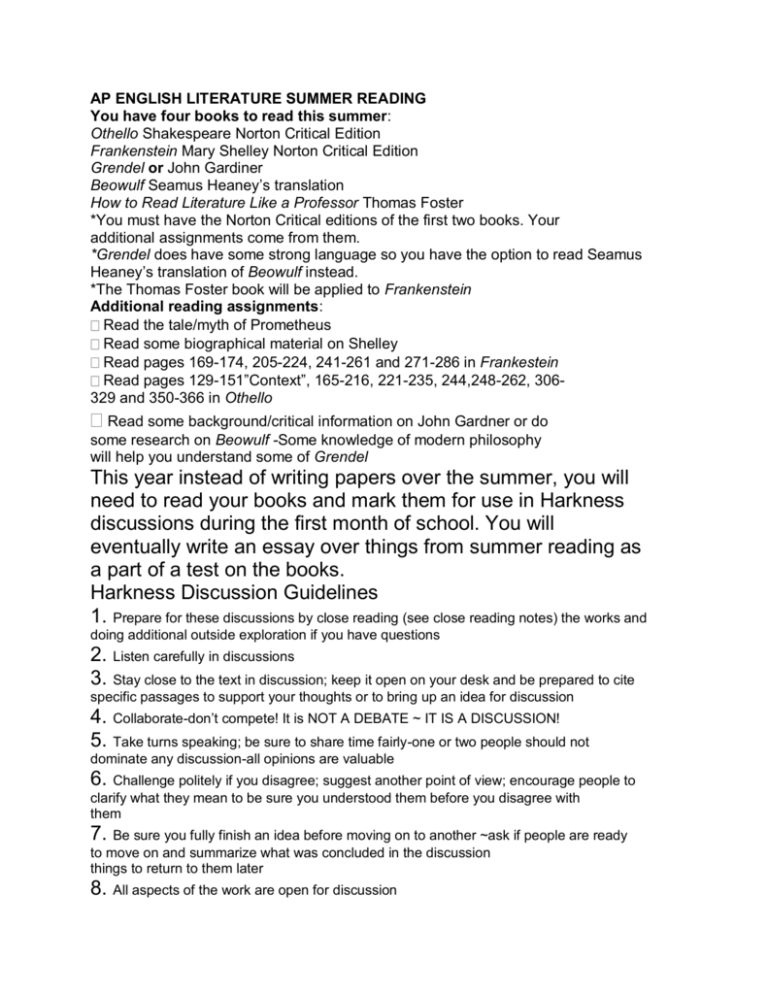
AP ENGLISH LITERATURE SUMMER READING You have four books to read this summer: Othello Shakespeare Norton Critical Edition Frankenstein Mary Shelley Norton Critical Edition Grendel or John Gardiner Beowulf Seamus Heaney’s translation How to Read Literature Like a Professor Thomas Foster *You must have the Norton Critical editions of the first two books. Your additional assignments come from them. *Grendel does have some strong language so you have the option to read Seamus Heaney’s translation of Beowulf instead. *The Thomas Foster book will be applied to Frankenstein Additional reading assignments: Read the tale/myth of Prometheus Read some biographical material on Shelley Read pages 169-174, 205-224, 241-261 and 271-286 in Frankestein Read pages 129-151”Context”, 165-216, 221-235, 244,248-262, 306329 and 350-366 in Othello Read some background/critical information on John Gardner or do some research on Beowulf -Some knowledge of modern philosophy will help you understand some of Grendel This year instead of writing papers over the summer, you will need to read your books and mark them for use in Harkness discussions during the first month of school. You will eventually write an essay over things from summer reading as a part of a test on the books. Harkness Discussion Guidelines 1. Prepare for these discussions by close reading (see close reading notes) the works and doing additional outside exploration if you have questions 2. Listen carefully in discussions 3. Stay close to the text in discussion; keep it open on your desk and be prepared to cite specific passages to support your thoughts or to bring up an idea for discussion 4. Collaborate-don’t compete! It is NOT A DEBATE ~ IT IS A DISCUSSION! 5. Take turns speaking; be sure to share time fairly-one or two people should not dominate any discussion-all opinions are valuable 6. Challenge politely if you disagree; suggest another point of view; encourage people to clarify what they mean to be sure you understood them before you disagree with them 7. Be sure you fully finish an idea before moving on to another ~ask if people are ready to move on and summarize what was concluded in the discussion things to return to them later 8. All aspects of the work are open for discussion 9. You are responsible for the success of the discussion; at this point you are capable of “digging” into the work; that it is-you are graded on your participation in the discussions, both verbal and non-verbal How To Read Literature Like A College Professor assignment Using Frankenstein, select two of the starred chapters and prepare notes to discuss in one of your Harkness tables. _ Introduction: How'd He Do That? How do memory, symbol, and pattern affect the reading of literature? How does the recognition of patterns make it easier to read complicated literature? Look for a symbol or pattern in Frankenstein and think about how it impacts your appreciation of the themes of the book. _ Chapter 1 -- Every Trip Is a Quest (Except When It's Not) List the five aspects of the QUEST and then apply them to Frankenstein. _ Chapter 10 -- It's More Than Just Rain or Snow Discuss the importance of weather in the novel, not in terms of plot. Interlude -- Does He Mean That _ Chapter 11 --...More Than It's Gonna Hurt You: Concerning Violence Present examples of the two kinds of violence found in the novel. Show how the effects are different. _ Chapter 12 -- Is That a Symbol? Use the process described on page 106 and investigate any symbol in the book. _ Chapter 13 -- It's All Political Assume that Foster is right and "it is all political." Use his criteria to show that Frankenstein was/is political. _ Chapter 19 -- Geography Matters... Discuss at least two different aspects of Frankenstein that Foster would classify under "geography." _ Chapter 25 -- Don't Read with Your Eyes After reading Chapter 25, choose a scene or episode from the novel. Contrast how it could be viewed by a reader from its own time with how it might be viewed by a contemporary reader. Focus on specific assumptions that the author makes, assumptions that would not make it in this century. Adapted from Assignments originally developed by Donna Anglin. Notes by Marti Nelson. If you have questions, you may email me over the summer at chris.long@sugarcreek.k12.oh.us
